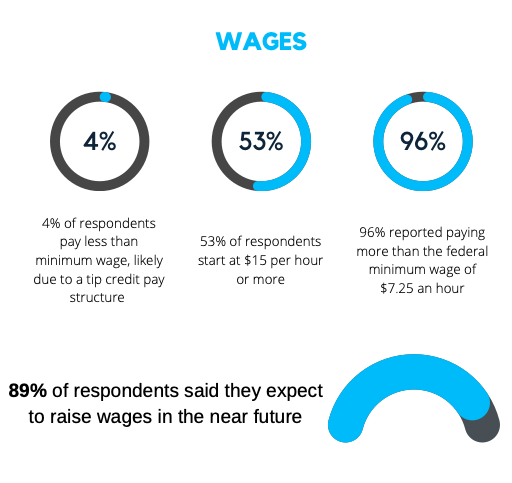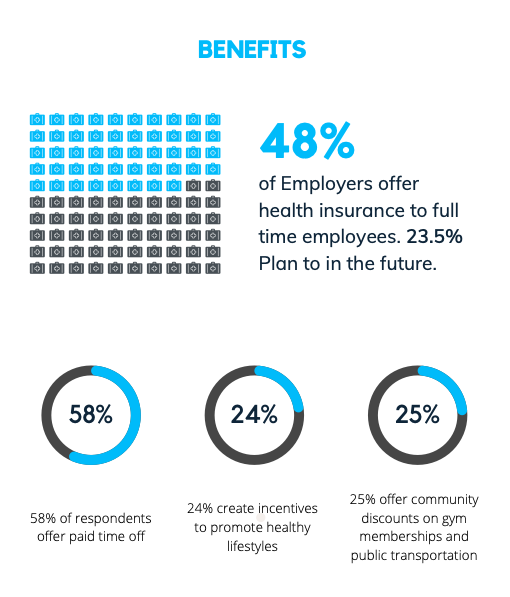In a survey, we asked posters to tell us how they contribute to better work conditions. Here’s what you told us.
From the death of Anthony Bourdain to the #MeToo movement — a national discussion began to take place, exposing the all too common, challenging work conditions of many restaurant workers. Chefs, restaurateurs, activists, and industry workers across the nation have spoken out about what needs to change, creating a transitional point in the future of our industry. Since then, we know many employers have actively sought out ways to improve employee well-being, but we wanted to hear directly from you on how things are changing. We sent out a survey to employers across the country, and here is what you told us.
Most employers are offering more than the federal minimum wage.
When we asked employers what their starting wages were, 96% reported paying more than the federal minimum wage of $7.25, and 53% start at $15 or more. Only 4% of respondents pay less than the federal minimum wage, likely due to a tip credit pay structure. We see a trend of employers increasing pay to stay competitive and improve employee retention — creating competition and pushing others to raise starting wages above the legal minimum wage of their area.
Our survey represents a small fraction of employers, but wages are rising. 89% of respondents said they expect to raise wages in the future, and it’s more common to find a restaurant job making more than minimum wage than it was even three years ago.

Restaurants are changing up tip structures.
Tips are another significant indicator of how much an employee can make working in a restaurant. Based on our survey results, 61% of restaurants use a pooled tip system, 23% let tipped employees tip out non-tipped employees, and 16% have removed tips with or without a service charge in its place. A pooled tip system is slowly becoming the more common tip structure. While there is debate on the negative impact tipping has on our industry, pooling can be more equitable and encourage teamwork.
Employers are adding health insurance and other benefits to increase employee wellbeing.
The unfortunate loss of a legend, Anthony Bourdain, caused another conversation over substance abuse and the physical and mental health issues prevalent in our industry. Through groups like Ben’s Friends, national media coverage, and industry workers speaking out on their experiences with these issues — a shift occurred in our industry. Restaurant owners started to consider the impact they have on the overall well-being of their employees. Slowly we’ve seen a rise in establishments offering benefits to encourage healthier lifestyles and a more sustainable workforce.
When asked about benefits, 48% of employers claim to offer health insurance to full-time employees, and 23.5% said they plan to in the future. While providing health insurance can be financially unrealistic for many independent restaurants, other benefit programs can help encourage employee engagement and well-being. We saw 57.8% of respondents offer paid time off, 25.3% offer community discounts on things like gym memberships and public transportation, and another 24% create incentives to promote healthy lifestyles among their employees.

We all know there is a labor shortage in our industry, and as we are reaching the other side of this pandemic, many workers are on the fence about returning to work in restaurants. Staying competitive by adding benefits or increasing wages, even just a little, can go a long way to bringing in applicants. While it’s not financially possible for every establishment, and it’s far easier said than done, there are other ways to increase employee engagement. Reach out to other businesses in your area and see if you can create a service-sharing discount program — or sit down with your employees and discuss ways to improve morale. It could be a new scheduling process so people can take days off, or maybe even a new tip structure so everyone can participate. Based on our survey results, the industry is changing for the better, and those places that follow suit are going to create competition as we move forward.
